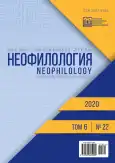Polyphonic collegiality of points of view in the “poetic composition” by B.A. Uspenskiy
- Authors: Guan Y.1
-
Affiliations:
- Nanjing Normal University
- Issue: Vol 6, No 22 (2020)
- Pages: 385-392
- Section: РУССКАЯ ЛИТЕРАТУРА
- URL: https://journal-vniispk.ru/2587-6953/article/view/302775
- DOI: https://doi.org/10.20310/2587-6953-2020-6-22-385-392
- EDN: https://elibrary.ru/FKAUAH
- ID: 302775
Cite item
Full Text
Abstract
We consider the problems of composing a literary text based on the material of texts by B.A. Uspenskiy. It is proved that as a compositional possibility in the formation of a work can be elicit one or many points of view from which the narration in the literary work is conducted on the concept of “polyphonic collegiality”, in the other words, it finds expression both “internal” (with respect to the work) and “external” points of view on how the point of view of collegiality in the text is understood and determined. Collegiality is one of the main characteristics of the Russian national spirit, which has a telling Impact not only on the creative thoughts of Russian writers, but also on the thinking of Russian theorists in the construction of literary theories. It is justified that the poetics of B.A. Uspenskiy's composition is a continuation and development of M.M. Bakhtin's theory, that M.M. Bakhtin's polyphony is only one of the components in the relation of various points of view in ideological terms. According to B.A. Uspenskiy, the composition of literary text is a multidimensional spatial “free and organic unity”, consisting of multifaceted points of view, possessing both their relative independence and interconnected among themselves.
About the authors
Yuee Guan
Nanjing Normal University
Author for correspondence.
Email: gye_1970@126.com
ORCID iD: 0000-0001-9821-1030
Associate Professor of Russian Language and Literature Department
Nanjing, People's Republic of ChinaReferences
- Khoruzhiy S.S. Aleksey Khomyakov: ucheniye o sobornosti i tserkvi [A.S. Khomyakov: Doctrine on Collegiality and Church]. Bogoslovskiye trudy. Sbornik 37 – Theological Works. Collection of 37. Moscow, Publishing Council of the Russian Orthodox Church, 2002. (In Russian).
- Kolesov V.V. Zhizn’ proiskhodit ot slova… [Life Begins with the Word…]. St. Petersburg, Zlatoust Publ., 2015. (In Russian).
- Khomyakov A.S. Pis’mo k redaktoru «L’Union Chretienne» o znachenii slov «kafolicheskiy» i «sobornyy» po povodu rechi ottsa Gagarina, iyezuita [Letter to the Editor of L’Union Chretienne on the Meaning of the Words “Catholic” and “Conciliar” Regarding the Speech of Father Gagarin, the Jesuit]. In: Khomyakov A.S. Polnoye sobraniye sochineniy: v 8 t. M.: Universitetskaya tipografiya [Khomyakov A.S. Full composition of writings: in 8 vols.], 1886, vol. 2, pp. 319-328. (In Russian).
- Losskiy N.O. Istoriya russkoy filosofii [History of Russian Philosophy]. St. Petersburg, Azbuka Publ., 2018. (In Russian).
- 黑格尔. 历史哲学. 上海:上海书店出版社,2001. (In Chinese).
- Gorelov A.A. A.S. Khomyakov: ucheniye o sobornosti i russkaya obshchina [A.S. Khomyakov: Doctrine on "Sobornost" (Collegiality) and Russian Community]. Znanie. Ponomanie. Umenie – Knowledge. Understanding. Skill, 2017, no. 2. pp. 78-97. (In Russian).
- 张杰. 陀思妥耶夫斯基小说创作艺术的“聚和性”.《外国文学研究》, 2010, no. 5, pp. 73-78. (In Chinese).
- Minenkov G.Y. Sobornost’ [Collegiality]. Noveyshiy filosofskiy slovar’ [The Newest Philosophical Dictionary]. Minsk, V.M. Skakun Publ., 1998, p. 630. (In Russian).
- Esaulov I.A. Kategoriya sobornosti v russkoy literature [Collegiality category in Russian Literature]. Petrozavodsk, Petrozavodsk State University Publ., 1995. (In Russian).
- Bakhtin M. Problemy poetiki Dostoyevskogo [Problems of Dostoevsky's Poetics]. St. Petersburg, Azbuka Publ., 2017. (In Russian).
- Uspenskiy B.A. Poetika kompozitsii [A Poetics of Composition]. St. Petersburg, Azbuka Publ., 2000, 348 p. (In Russian).
Supplementary files









